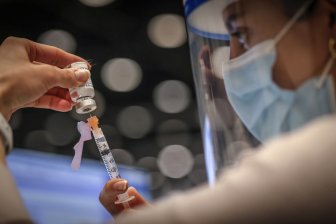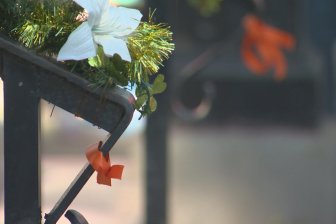The latest coronavirus news from Canada and around the world Wednesday. This file will be updated throughout the day. Web links to longer stories if available.
10:15 a.m.: Ontario is reporting 184 new cases of COVID-19 and 14 deaths on Wednesday. Locally, there are 46 new cases in the Region of Waterloo, 19 in Grey Bruce, 17 in Toronto, 17 in Hamilton and 16 in Peel Region. Nearly 27,300 were tests completed.
9:42 a.m.: Coronavirus deaths in Russia hit a record for the second day in a row on Wednesday, with the authorities reporting 669 new deaths, the highest daily tally in the pandemic. The previous record, of 652 new deaths, was registered on Tuesday.
Russia has struggled to cope with a surge in infections and deaths in recent weeks that comes amid rather slow vaccination rates.
Russia’s state coronavirus task force recorded has been registering over 20,000 new coronavirus cases and around 600 deaths every day since last Thursday. On Wednesday, 21,042 new contagions were recorded.
Russian officials have blamed the surge, which started in early June, on Russians’ lax attitude toward taking necessary precautions, growing prevalence of more infectious variants and laggard vaccination rates. Although Russia was among the first countries to announce and deploy a coronavirus vaccine, just over 15% of the population has received at least one shot.
Russia’s coronavirus task force has reported more than 5.5 million confirmed coronavirus cases in the pandemic and 135,214 deaths.
9:42 a.m.: Dr. Rochelle Walensky, director of the Centers for Disease Control and Prevention, says the CDC is leaving it up to local officials to set guidelines for mask-wearing as the highly contagious delta variant of the coronavirus surges in areas with low vaccination rates.
Walensky said Wednesday on NBC’s “Today” show that “we’ve always said that local policymakers need to make policies for their local environment,” but added CDC guidelines broadly indicate those who are vaccinated don’t need to wear masks.
Health officials in Los Angeles County are recommending people wear masks indoors in public places regardless of their vaccination status.
Separately, the World Health Organization has reiterated its longstanding recommendation that everyone wear masks to lessen the spread of the coronavirus.
Walensky told ABC’s “Good Morning America” on Wednesday the “context in which the WHO is making recommendations is very different than us here in the United States” since less than 15% of the world is vaccinated.
As for the recommendation by officials in Los Angeles County, Walensky said “we are still seeing an uptick in cases in areas of low vaccination and in that situation, we are suggesting that policies be made at the local level.”
9:36 a.m.: The Canadian economy contracted in April as real gross domestic product posted its first decline since April 2020 during the first wave of the pandemic.
Statistics Canada said Wednesday real gross domestic product fell 0.3 per cent in April, which was better than an initial estimate a few weeks ago of a drop of 0.8 per cent.
The agency also said its preliminary estimate for May showed a similar drop of 0.3 per cent as many restrictions remained in place through the month as the country grappled with the third wave of the COVID-19 pandemic.
Driving the decline in April was a 5.5 per cent drop in the retail sector after two months of increases, including a strong March where retail sales hit $55.3 billion, a year-over-year increase of 26.7 per cent. Manufacturing fell one per cent in April after growth in March of 1.5 per cent.
Statistics Canada also noted that the real estate sector contracted 0.7 per cent in April, its first drop since October 2020, as home sales slowed in Canada's major urban centres.
Accommodation and food services declined 4.6 per cent in April, the agency said.
9:35 a.m.: The Star has attempted to create an accurate tally of the number of Ontarians who died of COVID after acquiring the virus in hospital using a variety of incomplete public sources, but the true toll is unclear. Experts say a lack of transparency about the virus’s worst possible outcome makes it harder for hospitals to ensure they are making the right calls around infection prevention and control, and clouds the public’s understanding of the province’s overall pandemic response.
Taking a hard look at how many people caught COVID in hospital and died, they say, will bring us closer to answering one crucial question: Could we have saved more lives?
As of June 19, Public Health Ontario has recorded 569 hospital outbreaks, each defined as two or more laboratory-confirmed cases with a common epidemiological link within a 14-day period, resulting in 6,306 cases.
Read the full story from the Toronto Star here.
6:44 a.m.: From home improvements to having babies to professional development, some people maximized their time in the pandemic, while pandemic fatigue plagued others.
“Both personality and individual circumstances can affect how people respond to the pandemic,” said Jacob Hirsh, an associate professor at the University of Toronto’s Rotman School of Management.
Some people, said Hirsh — whose area of expertise includes the study of personality, motivation and decision-making — have a hard time being idle and feel compelled toward productive effort. “When their usual goals were disrupted, these are the people who were most likely to rapidly adopt new ones.”
Home improvement, for instance, has been a focus for many people given the extra time spent at home, said Hirsh. Others have picked up old hobbies, such as playing musical instruments, and furthered their education.
Read the full story here.
6:43 a.m.: The wait is over. Come Wednesday, most Ontarians can hit up a barbershop, catch a movie at an outdoor cinema and more as the province enters Step Two of its road map to reopening.
The move comes two days sooner than the planned July 2 start date, and just in time for Canada Day, thanks to rising vaccination rates and other key health indicators.
Notably, the Region of Waterloo will stay in Step One due to surging cases of the Delta COVID-19 variant.
Here are the answers to some of your burning questions.
Read the full story from the Star’s Kevin Jiang.
6:31 a.m.: Statistics Canada will say this morning how the economy fared in April, and give a glimpse into May's reading on real gross domestic product.
The agency's initial estimate for April was for a drop in economic output of 0.8 per cent, which if finalized today would be the first decline since the one seen in April 2020 during the first wave of the pandemic.
Loading...
Loading...Loading...Loading...Loading...Loading...
May isn't expected to be much better with many restrictions still in place through the month as the country grappled with the third wave of the COVID-19 pandemic.
The expected readings in both months is why many private bank economists are expecting almost no growth in real GDP for the second quarter.
The last month of the quarter, June, is where the experts are looking for signs of a consumer-led recovery as vaccination rates rise, restrictions roll back and cooped up Canadians have a chance to spend on goods and services.
Statistics Canada won't give its early estimate for June's GDP reading until the end of next month at which time it will also finalize the reading for May.
6:29 a.m.: The Queensland and Western Australia state governments on Wednesday advised people under age 40 not to take the AstraZeneca vaccine because of the risk of a rare blood clotting disorder, despite the Australian government making those shots available to all adults.
The state governments’ advice to those under 40 is based on British government guidelines, while the new federal government’s position acknowledges the scarcity of the Pfizer vaccine and an urgent need to accelerate a slow national rollout.
The disagreement has stoked confusion as around half Australia’s population is locked down in Queensland, Western Australia, New South Wales and the Northern Territory due to new clusters, mostly of the delta variant, which is thought to be more contagious.
Australians have a choice of only two vaccines and locally manufactured AstraZeneca is more plentiful.
Queensland Chief Health Officer Jeannette Young said younger adults should wait for Pfizer to become available, despite only 5% of all Australians being fully vaccinated.
With only 42 coronavirus cases active in Queensland, AstraZeneca was not worth the risk for younger adults, she said.
6:27 a.m.: North Korean leader Kim Jong Un berated top officials for failures in coronavirus prevention that caused a “great crisis,” using strong language that raised the spectre of a mass outbreak in a country that would be scarcely able to handle it.
The state media report Wednesday did not specify what “crucial” lapse had prompted Kim to call the Politburo meeting of the ruling Workers’ Party, but experts said North Korea could be wrestling with a significant setback in its pandemic fight.
So far, North Korea has claimed to have had no coronavirus infections, despite testing thousands of people and sharing a porous border with China. Experts widely doubt the claim and are concerned about any potential outbreak, given the country's poor health infrastructure.
At the Politburo meeting, Kim criticized the senior officials for supposed incompetence, irresponsibility and passiveness in planning and executing anti-virus measures amid the lengthening pandemic, the North’s official Korean Central News Agency said.
Kim said “senior officials in charge of important state affairs neglected the implementation of the important decisions of the party on taking organizational, institutional, material, scientific and technological measures as required by the prolonged state emergency epidemic prevention campaign,” according to KCNA. This “caused a crucial case of creating a great crisis in ensuring the security of the state and safety of the people and entailed grave consequences.”
6:26 a.m.: Public health restrictions on businesses and gatherings are rolling back further in Ontario today.
The province moved into the second step of its economic reopening plan at 12:01 a.m.
That means hair salons and similar facilities can open today with masking rules, and retail stores can have more people inside.
Groups of up to 25 people can gather outdoors and five people can gather indoors.
Outdoor attractions and events like performances can open with capacity rules.
The changes are taking effect a few days ahead of schedule due to strong vaccination rates and other public health indicators.
6:25 a.m.: Health Canada is updating the label for the Oxford-AstraZeneca and COVISHIELD COVID-19 vaccines to add capillary leak syndrome as a potential side-effect.
The agency is also including a warning for patients with a history of the ailment to not get those vaccines.
Capillary leak syndrome is a very rare, serious condition that causes fluid leakage from small blood vessels (capillaries), which can result in the swelling of the arms and legs, sudden weight gain, low blood pressure, thickening of the blood and low levels of the albumin blood protein.
Health Canada and the Public Health Agency of Canada have been monitoring the condition since it was raised as a potential safety concern by the European Medicines Agency in April.
Earlier this month, the EU drug regulator said it reviewed cases of six people who had capillary leak syndrome after they had received a shot of the AstraZeneca vaccine, out of 78 million doses of the AstraZeneca and COVISHIELD vaccines administered in Europe and the United Kingdom as of May 27, 2021.
There has been one case of capillary leak syndrome following vaccination with the AstraZeneca or COVISHIELD COVID-19 vaccine reported in Canada as of June 11th.
Health Canada has also updated the label for the vaccines with information about very rare events of blood clots associated with low levels of platelets following immunization.
Adblock test (Why?)
Today’s coronavirus news: Ontario reporting 184 new COVID-19 cases, 14 deaths; Public health rules roll back further as Ontario enters Step 2 of reopening Wednesday - Toronto Star
Read More












/https://www.thestar.com/content/dam/thestar/news/canada/2021/06/30/coronavirus-covid-19-updates-toronto-gta-ontario-june-30/covid_rolling.jpg)








